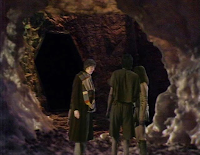Welcome to
the concluding part of my Futurama/Red
Dwarf comparison, split in half because of readability and making the best
of my tendency to make these articles probably far too long. Let’s get straight
into it with a look at some more classic sci-fi tropes…
Sunday, 26 March 2017
Sunday, 19 March 2017
Bender Than Life: Part 1
(NB: Somebody else beat me to the title “Futurama
Echoes”. Alternative titles include “Stasis Leak Pilot 3000” and “Listerama”.)
In 1988, the
science fiction sitcom Red Dwarf began
on BBC2. The first episode sees Dave Lister frozen in time and wake up in the
far future.
In 1999,
shortly after Red Dwarf had seemingly
wound up for good, the science fiction sitcom Futurama began on FOX. The first episode sees Philip J. Fry frozen
in time and wake up in the far future.
Okay, it’s
an overly simplistic comparison… but it’s a rather good one to make, as it does
highlight the differences and similarities between the two shows.
Sunday, 12 March 2017
Broken Gamebooks: Realm of Chaos
Way, way
back in the mists of time of, erm, about three months ago, when I first started
this blog, my
very first post extolled the virtues of the GrailQuest adventure gamebook series. What I didn’t mention at the
time is that some of the later books in the series suffer from serious
playability issues and a lack of proofreading… which they (for me) get away
with because of the series’ wit and creativity. So, because heaven knows this
blog isn’t niche enough as it is, why not try and summarise those issues and
see if they can be fixed?
Thursday, 9 March 2017
Another Insane Objective
On 27
December 1977, Star Wars finally
received a theatrical release in the United Kingdom, allowing us all to see
what the United States had been making such a fuss over since May of that year.
Barely a week later, on 7 January 1978, Doctor
Who returned from its midseason break over the Christmas holidays with a
new four-part serial, Underworld.
If you’ve
happened to read any other piece that mentions both that first Star Wars film and Doctor Who, it is
quite likely those two facts happened to be mentioned. Because, you see, Star Wars is a good piece of science
fiction. Underworld isn’t.
The story
goes that the then-Doctor Who
producer, Graham Williams, had attended a preview screening of George Lucas’
film and realised that his show’s production values weren’t really going to be
able to hold a candle to this. He quickly made an attempt to try and enhance
the appeal of Underworld, which was
then in pre-production… but a confluence of factors (including Williams going
on holiday, another script turning out to be impossible to produce and
inflation severely affecting the budget requiring Williams to come up with an
unprecedented way of saving money) meant that a lot of the story ended up
looking like this:
And perhaps
the bigger problem is that Underworld simply
isn’t a very good story. It’s just not very interesting, which isn’t a
criticism you can really level at the other sci-fi franchise we’re discussing
here. And that’s why Underworld, and
indeed most of the rest of that season of Doctor
Who, has a tendency to be
mentioned rather disparagingly in connection with Star Wars – children went to the cinema to see an exciting,
impressive-looking piece of sci-fi, and then returned home to watch something
that was anything but.
But you may
be aware that there have been quite a few more Star Wars films since 1977. How did the Doctor Who stories of the time square up to them, and is the result
interesting enough for me to write a blog post about? Let’s find out. (For the
purposes of this article being readable, we’ll cover the six ‘main’ films in
the remainder of the original trilogy, the prequel trilogy and the one film in
the sequel trilogy that we’ve seen at time of writing, not Rogue One or the Clone Wars TV series.)
Thursday, 2 March 2017
Edit Wars #2
 |
| THIS SCOREBOARD IS A COMPLETE AND UTTER LIE |
Let joy be
unconfined: it’s one of those other articles about Robot Wars I promised you some time ago. (This story may already be
familiar to you if you’re a big fan of the show, but I still reckon it’s worth
telling again.) Last
time around, we were interested in two different versions of the same
episode. What we have here is a rather different kettle of fish – there’s only
one version of this episode, but it’s been edited to avoid giving us the whole
story, and what really happened is alluded to later on in the series.






